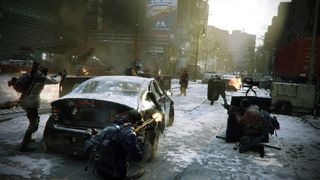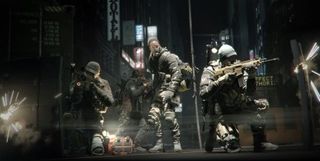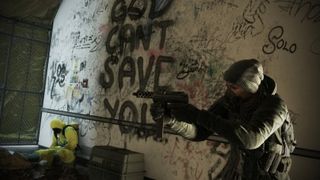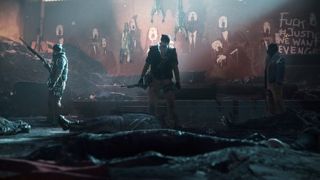The Division preview: Ubisoft's surprisingly deep RPG has an air of Destiny about it
Add friends for maximum enjoyment

There's so much going on in Ubisoft's The Division that it's difficult to know where to begin, so let's start with the premise: the end of days.
In 2001 the US government ran a simulation of a viral outbreak on American soil. The results showed that the country's infrastructure could not deal with such a situation should it arise, and that revelation forms the foundation of The Division.
If you've been following the story of the game – and let's face it, it's been so long coming that you've probably seen something – then you'll know that Ubisoft's new Tom Clancy title takes place in a mid-crisis New York. A devastating pandemic has swept through the country, bringing the USA to its knees, but we've not quite hit Fallout point – there's still hope to save humanity.
And that's where you come in. You are part of a classified team called 'The Division' sent in to New York to neutralise threats born out of the anarchy, which include rioters, escaped prisoners, and some particularly tough foes known as 'Cleaners' who don't tend to distinguish between healthy and sick humans when it comes to sinking bullets in heads.
So it's end times, and New York is your snowy playground. It's a big one, too. The game's Associate Creative Director Dr. Julian Geighty told us that it's "one of the most accurate recreations" of the city ever done in a game, almost 1:1. While we've by no means been able to verify that claim, we can confirm that it does indeed feel massive.
The Division was revealed all the way back at E3 2013, back when the PS4 and Xbox One were still toddlers, and has pretty much turned into an E3 mini-series. Since first being shown the game has been held back by two big delays: a delay to the beta, and the cancellation of the companion app. It's been a tough journey to launch but we're almost there – The Division will arrive on March 8.
The question is, was all of this worth the long wait?
Get daily insight, inspiration and deals in your inbox
Get the hottest deals available in your inbox plus news, reviews, opinion, analysis and more from the TechRadar team.
How did we get here?

What might surprise you about The Division is just how much depth it has as an RPG. To date it's been disguised as a tactical shooter backed up with RPG elements – but those elements are a far more significant part of the game than I expected.
First off, your character has abilities, split into three categories: medical, tech and security. Skills open up as you level up, and each can be upgraded. You also have perks – these are smaller talents that do things such as increase your protection against the virus, reveal more information on the map, or increase your medical kit inventory by a slot. Once perks are unlocked, you have them forever.
These aren't classes, however. It was a conscious decision to not include this, explained Geighty, to avoid "locking in" the player early in the game. It differentiates itself from a game like Fallout 4 in that you don't assign stats at the start, only your character's physical features.
As for weapons, you can carry a primary, a secondary and a sidearm. Each of these can be modded with upgrades found or bought along the way – better scopes, larger magazines etc. You'll often find these items on the bodies of fallen enemies, and the game avoids a Four Swords hoarding problem by ensuring every player gets to grab some loot after the gunfight.
But while the ability to customise your weapon is great, firing them isn't always so satisfying. Enemies in The Division are bullet sponges, and you'll often be bored of blasting an SMG at some ruffian's head by the time their health bar depletes and they finally hit the floor.
Still, the combat remains quite tactical, especially when playing with others. Skills can be synergised with friends for a better offensive, and that's also why Ubisoft killed the idea of having a class sytem; The Division tries to reward you for strategic thinking, something that would be limited by classes.
Speaking of other players, The Division's multiplayer experience is impressively seamless. Devoid of lobbies, the game instead lets you team up with friends in a live hub area. Then all you have to do is walk out of there and into the chaos of New York City.

The Division is an open-world game, and Ubisoft keeps it as open as possible by letting you explore the entire map from the start. The plot is unravelled through three separate story strands based around medical, security and tech (I'll come back to those) which you can tackle in whichever order you wish. And while The Division can be played alone, I feel like this is a game that will be best experienced with friends.
I've already mentioned the types of enemies you'll be up against, but there are also friendly NPCs who will ask for food, water and other items, rewarding you with other items in turn.
It's an oft-wrought criticism of Ubisoft that many of its games rest on the same tropes. The Division has some familiar hints – the Ghost Recon-esque cover system, a HUD that recalls Watch Dogs – but with its multiplayer dynamic and heavy RPG features it feels like a very different beast to what we've seen from the publisher before.

It also looks good. The New York setting, decorated with snow and Christmas lights (the pandemic starts on Black Friday), is wonderfully detailed in places.
For our hands on we played on an Xbox One version. Performance was mostly good, although there was the occasional lag when entering a new area, and some frame rate drops when combat got heated – but the latter was less noticeable.
The developers told us this wasn't a final version, and that it would feature some bugs that won't show in the final build. We certainly came across a few, including a soldier who hilariously glided across a road like a ghost instead of walking, a vanishing folder during a cutscene, and some NPCs that morphed into one another.
Hugh Langley is the ex-News Editor of TechRadar. He had written for many magazines and websites including Business Insider, The Telegraph, IGN, Gizmodo, Entrepreneur Magazine, WIRED (UK), TrustedReviews, Business Insider Australia, Business Insider India, Business Insider Singapore, Wareable, The Ambient and more.
Hugh is now a correspondent at Business Insider covering Google and Alphabet, and has the unfortunate distinction of accidentally linking the TechRadar homepage to a rival publication.
Most Popular


